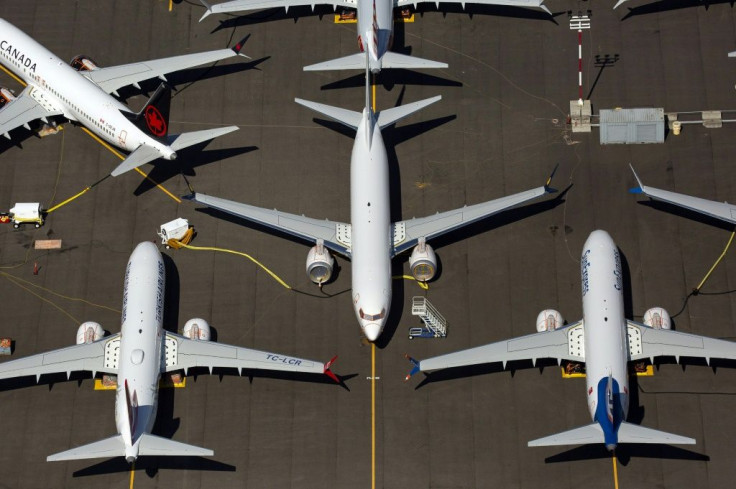Boeing Confirms 737 MAX Timetable As Profits Tumble

Boeing on Wednesday reported a sharp drop in third-quarter earnings due to the 737 MAX grounding but said it still expects regulatory approval this year to return the plane to service.
The company booked an additional $900 million in costs due to the MAX as it reported much lower profits than analysts expected. The top-selling MAX has been grounded since mid-March following two deadly crashes.
However, shares advanced after Boeing reiterated its timetable for MAX regulatory approval and said it expects to fully restore MAX production levels by late 2020.
"Our top priority remains the safe return to service of the 737 MAX and we're making steady progress," said Chief Executive Dennis Muilenburg.
Net income was $1.2 billion, down 50.6 percent from the year-ago period.
Revenues tumbled 20.5 percent to $20 billion, reflecting a hit from halted deliveries of the MAX.
The aviation giant, which has been in crisis mode following two MAX crashes that killed 346 people, said it "has assumed that regulatory approval of the 737 MAX return to service begins in the fourth quarter of 2019."
Key steps ahead of the Federal Aviation Administration test flight on the MAX include finalizing the software for flight simulation of the plane and bringing in outside pilots to review the training protocol, Muilenburg said during a conference call with analysts.
"There are tangible milestones being achieved but we still have additional work to do," he said.
The company, which trimmed its MAX production level, said it also expects to "gradually increase the 737 MAX production rate from 42 per month to 57 per month by late 2020."
Muilenburg said customers are sticking with the MAX despite the crisis.
"Our customers still around the world see the value of the 737 MAX and they know what it will ultimately bring to their operations," he said.
Further delays?
Boeing has been in close contact with the FAA and other global regulators on certification, which has dragged on for months beyond initial expectations.
Many analysts now expect the timeframe to be extended further following disclosures last week of text messages between two Boeing pilots in 2016 that raised questions about whether the company was aware of problems with a flight handling system that has been blamed for both crashes.
The company said it accounted for $900 million in additional costs due to MAX delays, lifting the total so far since the grounding to $9.3 billion.
The results came hours after Indonesian investigators briefed families of people killed in the Lion Air crash in October 2018.
In a slideshow presentation, Indonesia's National Transportation Safety Committee told relatives the regulator's report would cite problems with the Maneuvering Characteristics Augmentation System, a flight handling mechanism, as a "contributing factor."
A preliminary investigation of the deadly March 2019 Ethiopian Airlines crash has also pointed at the MCAS. Boeing's efforts to have the plane recertified have focused in part on upgrades to the MCAS.
Some aviation experts have called for Muilenburg's ouster following the accidents. He is scheduled to appear on Capitol Hill next week for the first time since the crashes.
On Tuesday, Boeing replaced commercial airplane chief Kevin McAllister, the most significant departure since the MAX crisis began.
Boeing also said it would trim its output of the 787 Dreamliner plane from the current 14 planes per month to 12 beginning in late 2020, citing the US-China trade war.
"The lack of orders from China in the past couple of years has put pressure on the production rate," Muilenburg said.
The company likewise pushed back the timeframe for the 777X, a long-range, wide-body plane, to early 2021 from late 2020. The plane's development has been slowed by issues with the engine, which is being developed by General Electric.
Boeing shares ended at $340.50, up 1.0 percent.
"Overall, investors are pretty happy with the Q3 report mainly because it could have been worse," said a note from Briefing.com.
The MAX return "could have been pushed to early or mid-2020 or possibly later."
© Copyright AFP 2024. All rights reserved.





















